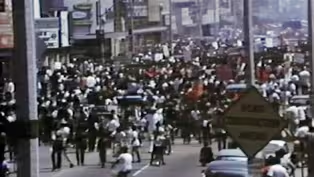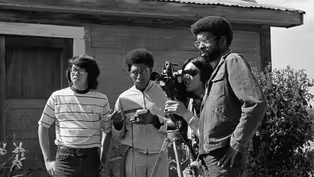
L.A. Rebellion Filmmakers Discuss Their Project One Films
Clip: Season 14 Episode 3 | 6m 1sVideo has Closed Captions
Filmmakers Ben Caldwell, Eddie Wong and Stormé Bright Sweet discuss their first films.
For years, Project One films have been a rite of passage for aspiring filmmakers at UCLA's School of Theater, Film and Television. Filmmakers Ben Caldwell, Eddie Wong and Stormé Bright Sweet discuss their Project One films. These filmmakers and films emerged from the L.A. Rebellion, a program initiative and cinematic movement that aimed to recruit students from diverse ethnic communities.
Problems playing video? | Closed Captioning Feedback
Problems playing video? | Closed Captioning Feedback
Artbound is a local public television program presented by PBS SoCal

L.A. Rebellion Filmmakers Discuss Their Project One Films
Clip: Season 14 Episode 3 | 6m 1sVideo has Closed Captions
For years, Project One films have been a rite of passage for aspiring filmmakers at UCLA's School of Theater, Film and Television. Filmmakers Ben Caldwell, Eddie Wong and Stormé Bright Sweet discuss their Project One films. These filmmakers and films emerged from the L.A. Rebellion, a program initiative and cinematic movement that aimed to recruit students from diverse ethnic communities.
Problems playing video? | Closed Captioning Feedback
How to Watch Artbound
Artbound is available to stream on pbs.org and the free PBS App, available on iPhone, Apple TV, Android TV, Android smartphones, Amazon Fire TV, Amazon Fire Tablet, Roku, Samsung Smart TV, and Vizio.
Providing Support for PBS.org
Learn Moreabout PBS online sponsorshipAlile: What I remember most is Project One, and Project One was crazy.
We were in the bullpens, and I bought a camera, a Bauer Super 8 camera.
I did my Project One right away because that was my dream to come to film school and make a film.
[Sound of projector running] ♪ [Music on film soundtrack] Ben: My Project One, I really was learning how to go from still photography to moving film.
So I was going from static to movement.
Woman: Raise the dead... Raise the comeback.
Ben: And I also was highly involved in animation.
So my Project One was a mixture of the two.
I ended up shooting a lot of intervalometer pictures--time lapses and stills and things like that, and I made them move similar to how you'd make them move in animation.
Luis: I think I remember working on the kitchen table on a Super 8 with the cutting and a razor blade, you know, and the chopper and trying to tape these things together.
Eddie: My Project One was, like, I had never done film before, barely shot photographs, knew nothing about what I was going to do.
I was in a panic... but I decided I was going to make a film of my father because it was a difficult subject because I kind of hated the guy.
Eddie, narrating film: I never knew much about my father as a child.
As I grew older, I never really saw him behind his laundryman mask, behind the chink, that stereotypic, docile, quiet, courteous little Chinaman deferring obediently to [Indistinct], the white man.
Eddie: I knew that my father had a different-- different parts of his personality, one that he had to put on a face for white society to survive as a laundryman, but also he had to preserve his dignity by writing poetry, doing calligraphy and all that.
So I knew I had a structure for the film, and then he just allowed me to film a lot to make it happen.
And like, you know, there's, like, tons of errors in the film.
I was learning how to focus a camera when I was shooting... Larry: Yeah!
Right, right... Eddie: So, like, Oh!
You have to focus, zoom in, focus, and then pull out and shoot.
I'd, like, start shooting, go in, and then focus, you know?
So it has a kind of a dreamy quality because of that, you know, out-of-focus look to it, which, you know, worked out OK, but it wasn't good craftsmanship.
And it's only over ten weeks.
So it's like, a really intense process.
You have to, like, crank it out and get it done.
And that kind of put extra pressure on you but also made you finish it, too.
Larry: I'm sitting next to Rufus Howard when you screened your film in Melnitz Hall the first time.
And when you got to the end of it, I remember Rufus Howard-- and he might have told you this.
He said, "The footage you shot of your father-- it looked like a forest when he was going through Kung Fu moves, he said, "Your father looked like a god."
Eddie: Wow...wow... Larry: I agreed with, you know.
So the film was powerful.
That was a really powerful film.
♪ Eddie: Well, a funny story.
You know, I showed him the rough cut, and he didn't like that sequence.
And he said, "My Kung Fu, I made too many mistakes.
You got to reshoot it."
Larry: Yeah.
Eddie: So I had to reshoot and reedit the film because he didn't like his Kung Fu sequence.
So...
He was happy with it in the end.
Larry: That's fair.
[Laughter] ♪ Stormé: "Single Parent Family" is because I grew up in a two-parent home, and I knew a woman who I could never figure out how she did it.
She had three active boys.
I mean, crazy active boys, and they lived across the street from me.
And they were twins.
They were wild hairs.
I am not kidding.
All of 'em wild hairs.
And the mother was so calm, and she had lost her husband.
He had been killed in a trucking accident, and she was the only single parent I ever knew.
So I think that was one of the inspirations.
And then when I finally started the film, I remembered meeting other people who had lost their spouses in my family.
So like, for instance, my father's father was burned up on the railroad.
They put coal in--the whatever the thing was, and he caught fire.
I had just learned that as I was going to UCLA.
And so my grandmother raised, like, five kids by herself.
And I never thought of my grandmother as a single parent.
You don't think like that.
But as I got older, I did.
And so that's why I chose only African-American people for that film.
But that was the inspiration for me.
Sandy Osawa: The curriculum was
Filmmaker Moctesuma Esparza Reflects on 'Requiem-29'
Video has Closed Captions
Clip: S14 Ep3 | 1m 25s | Filmmaker Moctesuma Esparza on Requiem-29, a film about the Chicano Moratorium in East LA. (1m 25s)
L.A. Rebellion: A Cinematic Movement (Preview)
Video has Closed Captions
Preview: S14 Ep3 | 30s | Following the Watts Uprising, UCLA increased film program enrollment of students of color. (30s)
Providing Support for PBS.org
Learn Moreabout PBS online sponsorship

- Arts and Music
The Best of the Joy of Painting with Bob Ross
A pop icon, Bob Ross offers soothing words of wisdom as he paints captivating landscapes.












Support for PBS provided by:
Artbound is a local public television program presented by PBS SoCal


